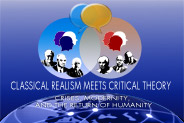Workshops
Second Workshop
Title: 'Classical Realism meets Critical Theory: Philosophies, Practices, Politics'
Date and time: 20-21 June 2015, 9am-5pm
Venue: Faculty of Social Sciences, 120 University Social Sciences Building
Ottawa, Ontario, Canada K1N 6N5 (click here for Google Maps)
Convener: Prof Michael C. Williams, University of Ottawa
Speakers and topics
- Richard Beardsworth (Aberystwyth University) - Towards a Critical Concept of the Statesperson
- Hartmut Behr (Newcastle University) - Conditions and Spaces of Critique. Herbert Marcuse, Hans Morgenthau, Eric Voegelin
- Lene Hansen (University of Copenhagen) - Student, Monster, Rocker? The Rolling Stone featuring the Boston Bomber and the Limits of Representation
- Richard Ned Lebow (Dartmouth College/Kings College) - Hans Morgenthau and Critical Realism
- Daniel J. Levine (University of Alabama) - The Apocalyptic Sting, Critical Realism, and the Politics of Jewish Fear
- Timothy W. Luke (Virginia Tech) - Caught Between Vulgar and Effete Realists: Repositioning Classical Realism and Critical Theory in Statecraft and International Studies
- Sean Molloy (University of Kent) - E.H. Carr in Frankfurt: The Twenty Years’ Crisis as an Exercise in Critical Theory
- Felix Roesch (Coventry University) - Unlearning in International Relations. Maruyama, Morgenthau, and Modernity
- Vibeke Schou Tjalve (Danish Institute of International Studies) - Security in Ocular Democracy: A (Critical) Realist Perspective
- Kamila Stullerova (Aberystwyth University) - Embracing Ontological Doubt: The Role of ‘Reality’ in Political Realism
- Lucian Ashworth (Memorial University) - Commentator
Download Workshop programme and abstracts
First Workshop
Title: “What is Political Realism? Exploring a Research Framework”
Date and time: 1-2 June 2013, 9am-5pm
Venue: Newcastle University, Great North Museum, Newcastle upon Tyne, UK
Workshop Programme and Abstracts(pdf, 385kb)
Abstract
In the social sciences, the term “realism” raises as many ideas and associations as it is elusive when enquiring into its history. It has been used by many, with a plethora of variations such as classical, structural, offensive etc., is and has been associated with a series of authors, sometimes more by means of intellectual appropriation than by respective authors themselves, as well as it has been used as a label for authors who have never used the term themselves. In order to gain some clarity about the term and concept of “realism”, the workshop intends to pursue the questions of what is political realism and how it can be used as, or elaborated into, a research framework, particularly for engaging questions of/on crises and modernity. These discussions take place before the background of a recent revival of “realism” and (re)appreciation of classical “realist” thinkers in the disciplines of International Relations, Political Science, and Philosophy.
Speakers and topics
- Sean Molloy (University of Kent) - The Machiavellian Ethics of Carr's The Twenty Years' Crisis
- Lene Hansen (University of Copenhagen) - In Search of a Feminist Classical Realism: Rebecca West on Power, War, and Sacrifice in the 1930s and 40s
- Felix Roesch (Coventry University) - Unlearning in International Relations. Maruyama, Morgenthau, and Modernity
- Richard N. Lebow (Kings College London) - Classical Realism and the Question of Order
- Richard Beardsworth (Florida International University) - The Idea of the Statesman in Political Realism
- Kamila Stullerova (Aberystwyth University) - Scepticism and Realist Epistemology
- Vibeke Schou Tjalve (Danish Institute of International Studies) - “Under the Pale Light of the Humanist Moon”? Realism, Secularism and International Politics in the Global Age
- Timothy W. Luke (Virginia Tech) - What is Political Realism? Understandings of Agency, Temporality and Spatiality in "Classical" Realism
- Michael C. Williams (University of Ottawa) - Concluding Remarks and Further Strategising
This is a free event but places are limited, please register by sending an email to: Kristinne Sanz, kristinne.sanz@ncl.ac.uk.
***
